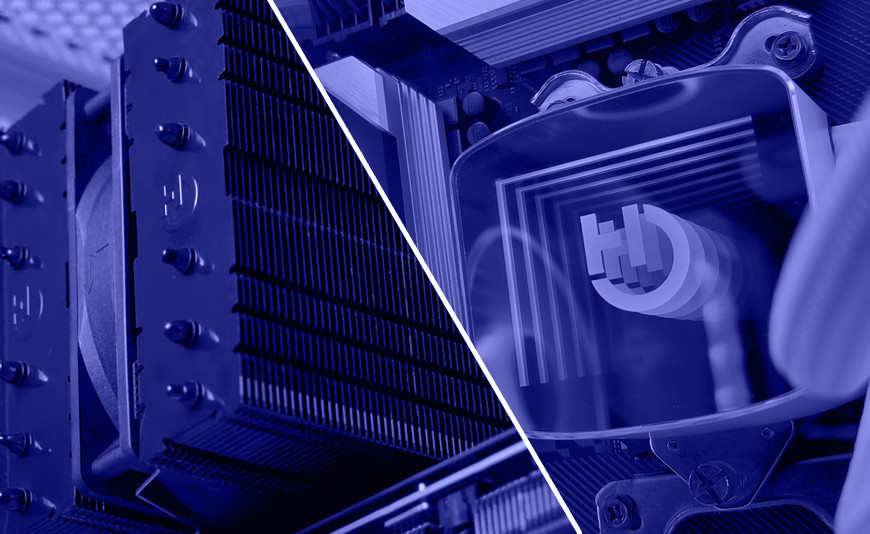LIQUID COOLING VS AIR COOLING
- 22 Nov, 2024
- Home
- 1 Comments

If you're building or upgrading your PC, cooling is an essential factor, and you'll need to choose between two main options: liquid cooling or air cooling (traditional).
Cooling is a crucial aspect of a PC because core components like the processor and the graphics card generate significant heat. If this heat isn’t efficiently dissipated, it can cause performance and stability issues, or in the worst case, permanent hardware damage.
Air Cooling
Air cooling is the most common option. It relies on a heat sink, essentially a metal block with fins that absorb heat from the processor. These typically have one or more fans blowing air across the fins to disperse the heat outside the case.
Liquid Cooling
On the other hand, liquid cooling is significantly more sophisticated. The liquid, usually a mix of distilled water and additives, is stored in a reservoir where a pump distributes it throughout the system. The liquid circulates through tubes, which can be rigid (moldable plastic) or flexible (silicone).
The fourth component is the cooling blocks. There can be two, attached to the processor or the graphics card. Once cooled, the liquid passes through the blocks, which in turn cool the components. This liquid absorbs the heat and carries it through the tubes to a radiator, where fans cool it down again. From the radiator, the liquid flows back to the reservoir, completing the loop. The downside is that it's more complex to install due to the number of parts and requires regular maintenance (e.g., the liquid often needs replacement every year or year and a half).
Pros and Cons of Each System
Air Cooling:
· Pros:
- Affordable: Air coolers, even high-end ones, are generally cheaper than liquid cooling systems.
- Easy to Install: Installing an air cooler is straightforward; there’s no need to worry about liquid leaks or mounting radiators in specific spots.
- Low Maintenance: Once installed, air coolers need minimal upkeep—just occasional dust cleaning and thermal paste replacement.
· Cons:
- Noise: Air coolers can be noisy, especially when running at full capacity. This issue is more pronounced in summer, as high ambient temperatures demand more effort from the fans.
- Size and Space: Some air coolers are bulky, taking up considerable space inside the case and potentially interfering with other components, like RAM, making replacements or upgrades inconvenient.
- Cooling Limits: While efficient, air cooling has its limits in handling high-performance CPUs.
Liquid Cooling:
· Pros:
- Thermal Efficiency: Liquid cooling systems are more effective at dissipating heat, keeping CPU temperatures lower—especially important for powerful processors. This allows you to maintain performance without throttling.
- Quieter Operation: Since liquid transfers heat more efficiently, radiator fans don’t need to work as hard, resulting in significantly less noise.
- Aesthetic Appeal: Custom liquid cooling systems are visually impressive, and RGB lighting can add a spectacular look to your PC setup.
· Cons:
- Cost: Custom liquid cooling systems are expensive. Even an "All-in-One" (AIO) liquid cooler is usually pricier than air coolers.
- Maintenance: Custom systems require periodic flushing and liquid replacement. However, AIO systems simplify this by omitting the reservoir and integrating the pump with the CPU block, requiring far less maintenance.
- Installation Difficulty: Installing a liquid cooling system, especially a custom one, can be challenging. While AIO systems are easier to install, they still involve radiators and tubing.
- Leak Risk: Although rare, leaks in a liquid cooling system could damage vital PC components.
Conclusion
If you’re looking for a simple, cost-effective, and reliable solution for a mid-range PC, air cooling is more than sufficient. However, if you're building a high-performance PC and value aesthetics, thermal efficiency, or low noise, liquid cooling is the way to go.
Still unsure? Don’t worry! We highly recommend watching the video created by our friends at InfoComputer on this topic: https://www.youtube.com/watch?v=-nSsYlxWbfQ. It's a great way to make your final decision. See you next time!







¿Vuestros equipos de refrigeraciones líquidas están hechas en China? Gracias.